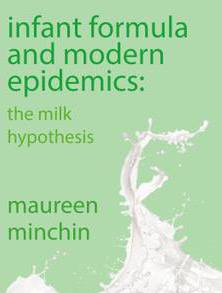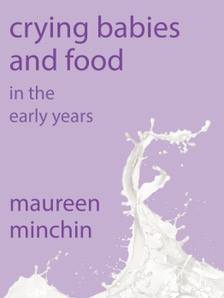You may have read our earlier piece about the life-work of Maureen Minchin ‘Milk Matters’ published in 2015 and which she toured the UK to speak about earlier in 2016.
“This book is a revelation”, said one reader. The revelations are solidly based on decades of research and working with families of allergic children. In fact, there are three inter-related books within this one large hardback.
Book 1 argues the Milk Hypothesis, that immune damage has been acquired vertically, compounding intergenerationally, through early infant nutrition; and that infant nutrition is the single most important contributor to the diseases of ‘modern’ societies;
Book 2 documents the ongoing real life experiment of infant formulas, and their known and emerging consequences for lifelong health. It reveals frightening facts from industry-funded research, and explodes the pervasive myth that industrial products are “nearly as good” as breastmilk;
Book 3 links the science and history to everyday infant problems, like colic, reflux, disturbed sleep and allergy of every kind, giving practical advice about current controversies, and preventing or resolving such diet-related distress in young children.
Those who read this book will be convinced of the necessity of enabling women to breastfeed their children, and the urgent need to provide women’s milk for children whose mothers cannot do so.
If enough people read it, western society will have to change; and both current and future generations will suffer substantially less unnecessary illness and early death.
And the WONDERFUL news is that the three books within the hardback Milk Matters are now available as 2 inexpensive e-books for everyone to access.
Kindle UK£7.70 each
Kobo CAN$10.09 each (about £6.01 – correct on Nov 5th 2016)
iTunes US$9.99 each (about £7.98 – correct on 5th Nov 2016)
Green contains books 1&2, which is the science and history; purple contains book 3, which is the practical allergy guide most appropriate for families.
To get a taster of what is within the 831 pages, thanks to Iona Macnab of iLactation you can get the big picture of what Maureen is saying in her book ‘Milk Matters: infant feeding and immune disorder’ by watching a presentation she did for them in 2015. We urge you to take the time out to watch this, because it will serve as a guide to what you need to know and can find out in the fully referenced book, which takes many many hours to get through. Click on the link to see all the slides and hear the talk. http://www.ilactation.com/present
Some reviews of the entire 3 book volume Milk Matters, are here:
“A life-changing book you need to read!”
Professor Mary Renfrew FRSE, Director, Mother and Infant Research Unit; Deputy Dean: Research, University of Dundee; Director, Scottish Improvement Science Collaborating Centre
“It’s a work of huge vision, based in extensive knowledge and understanding, yet it is easy to read and understand without specialist technical knowledge… A book to change the world, and people’s understanding of it.”
James Akré, WHO Nutrition (1980-2004)
“This is an important book, as relevant to gastroenterologists and genomic researchers as it is to unhappy parents of distressed babies.”
Katherine A. Dettwyler, Ph.D. Anthropology professor at the University of Delaware; author, Breastfeeding: biocultural perspectives
“Maureen Minchin has brought together a wide-ranging and extensive set of resources that will give readers a deeper understanding of how imperfect and problematic infant formula still is today. And she reminds us, once again, that breastfeeding truly matters. An incomparable gift to the world.”
Anthony F. Williams, Formerly Consultant in Neonatal Paediatrics and Reader in Child Nutrition, St George’s, University of London
“Minchin’s “milk hypothesis” uniquely brings together a lifetime of learning and practical experience. As she correctly observes, “There are many forms of evidence other than the scientific” so testing the hypothesis will require the cooperation of many conventional disciplines. It is to be hoped all those involved with infant feeding, whether as politicians, scientists, health professionals or parents, will give it serious consideration. Reading this book will no doubt be the starting point for fascinating research, but above all should stimulate greater global commitment to protect, promote and support human lactation and breastfeeding. Milk clearly does matter; the question is, just how much?“


